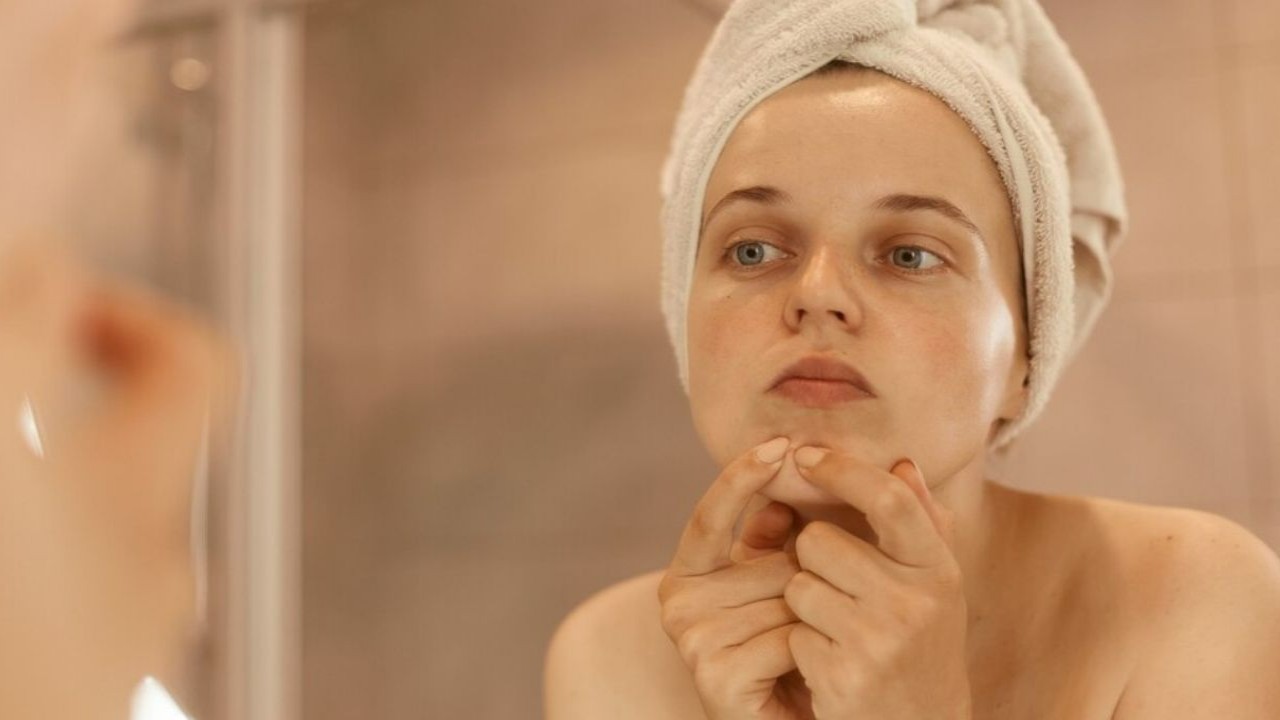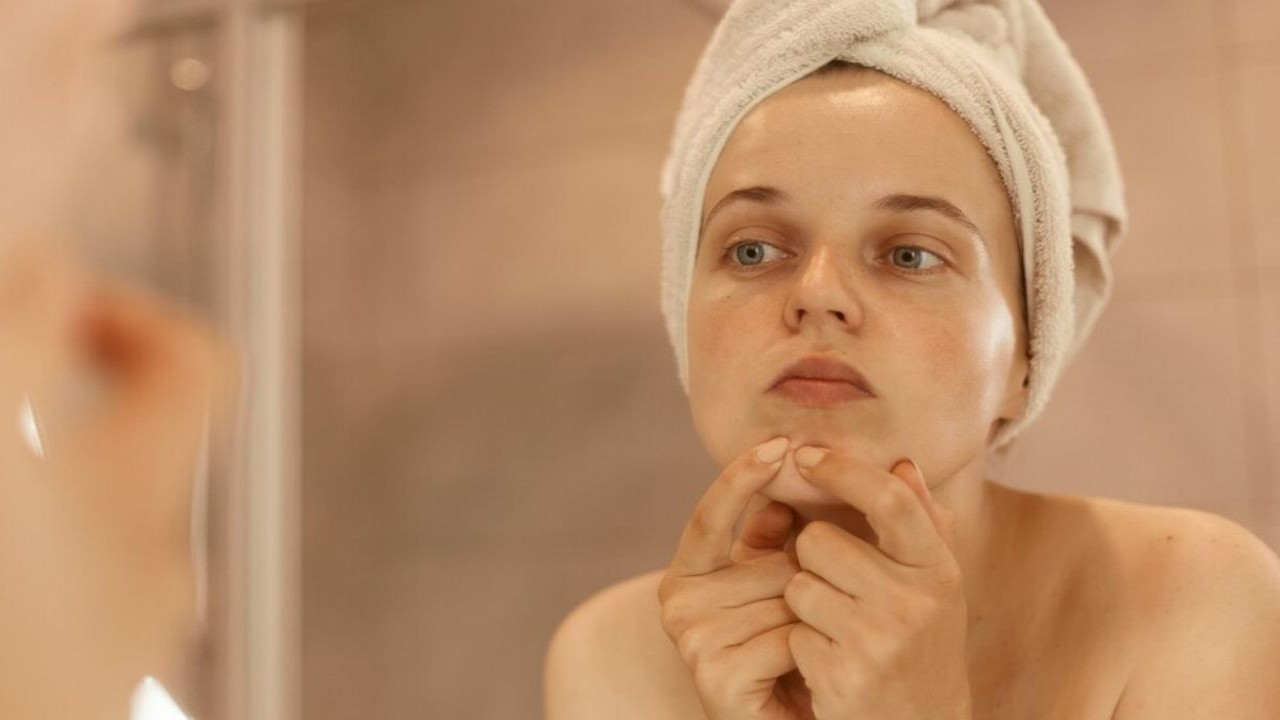Couldn’t resist the urge to squeeze that pimple? Here are some skincare tips to help you manage the aftermath and prevent future breakouts.

We’ve all made some skincare mistakes at some point, whether it’s forgetting to apply (and reapply) sunscreen, sleeping with makeup on, touching our faces too often, or, for those with acne-prone skin, popping that stubborn pimple. If you fall into that last category, you might often feel anxious about what to do after popping a pimple. But as time goes on, you may start to overlook the acne scars and find yourself popping the next one!
This article provides a comprehensive guide on what to do after you’ve accidentally squeezed a blemish, why it’s best to avoid doing so, how to prevent it, and effective ways to treat acne. Keep reading to find the solutions you need!
What to Do When a Popped Pimple Starts to Bleed

When you pop a pimple and it starts to ooze pus or bleed, your first priority should be to stop the discharge. Begin by thoroughly washing your hands with soap. Then, gently soak up the secretion using a clean Q-tip or cotton pad.
Once the pimple dries out, wash your face with a gentle cleanser and rinse with running water to ensure your skin is clean. Pat your face dry with a soft, clean towel, and resist the urge to touch the affected area.
To soothe the irritated skin, apply an ice cube to the area. You can also use hydrocortisone, an FDA-approved topical corticosteroid that helps reduce inflammation and speeds up wound healing. If you use this ointment, allow it a few minutes to work before proceeding.
Next, cover the popped pimple with a hydrocolloid pimple patch to protect it from germs. Many of these patches are infused with ingredients like salicylic acid, benzoyl peroxide, niacinamide, Centella Asiatica, tea tree oil, and witch hazel, which help heal the zit and promote faster skin recovery. For best results, leave the patch on for at least 6-8 hours before removing it.
The Cons of Popping a Pimple: Why You Should Avoid It

Popping a pimple, especially impulsively and without proper care, can cause long-term damage to your skin. The extent of the damage often depends on the type of pimple and how it was squeezed.
While popping a small pustule might not cause significant harm, popping deeper pimples, such as cystic acne, can lead to severe, lasting damage, including permanent scarring, hyperpigmentation, and even skin infections. This can also result in painful lesions, increased blackheads and whiteheads, and inflammation.
Is There a Safe Way to Pop a Pimple?

While most skincare experts advise against popping pimples, many of us notice that dermatologists sometimes do it during in-office procedures. So, is it really that bad?
The difference lies in the method. Dermatologists use a sterile tool called a “comedone extractor” to carefully remove the debris from the zit, followed by treating the area with an antibacterial solution. This process is done with precision and care to minimize skin damage.
In contrast, when we pop our pimples impulsively, often with unclean fingers, we risk causing long-term skin issues. Dermatologists also know which pimples can be safely popped and may use corticosteroid injections to enhance the healing process.
How to Prevent Popping Pimples

To prevent popping pimples, it’s important to understand the urge behind it. Many of us feel compelled to pop a pimple because it seems like it won’t go away on its own. The itchiness and tingling make it hard to resist!
The best way to avoid popping pimples is to treat them effectively. Use a reliable drugstore spot treatment with active ingredients like salicylic acid, benzoyl peroxide, or azelaic acid. Be patient and reapply the product at least twice a day. This can reduce your urge to pop the zit.
Another great prevention method is using hydrocolloid patches, which not only treat the pimple but also keep you from picking at it.
How to Treat Pimples Instead of Popping Them

Instead of popping a pimple, try these treatments:
- Over-the-Counter Spot Treatments: Use products with ingredients like salicylic acid, benzoyl peroxide, or azelaic acid to soothe and reduce pimples. These ingredients have anti-acne properties and can help dry out the zit.
- Topical Retinoids: If your skin is oilier and prone to breakouts, prescription-strength topical retinoids like adapalene, tretinoin, or tazarotene can be effective. These should be used under the guidance of a dermatologist, as they can be strong and cause irritation.
- Topical Antibiotics: Dermatologists may prescribe topical antibiotics such as Clindamycin or Erythromycin, which have proven anti-acne benefits. They might also recommend oral antibiotics for more severe cases.
- Anti-inflammatory Treatments: To reduce inflammation and support skin healing, use soothing products like aloe vera, niacinamide, or Centella Asiatica gel. Non-comedogenic moisturizers are also important to keep the skin hydrated without causing more breakouts.
How Long Does an Acne Scar Last After Popping?
The duration of an acne scar depends on its depth. Popping shallow pustules may leave smaller scars, while deeper cysts and nodules can result in more pronounced, long-lasting scars.
When Should You Consult a Dermatologist?

If over-the-counter acne treatments aren’t working, or if you’ve popped a pimple and are concerned about the resulting scar or hyperpigmentation, it’s time to consult a dermatologist. A skin specialist can provide effective treatments to help reduce scarring and prevent further damage.
While it’s tempting to pop pimples, it’s crucial to resist this habit to avoid permanent skin damage. Instead, focus on treating zit at their early stages with proper skincare routines and products like adapalene.


